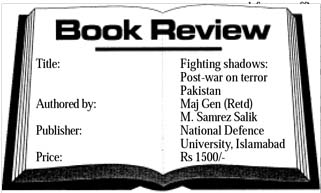Title: Fighting shadows: Post-war on terror Pakistan
Authored by: Maj Gen (Retd) M. Samrez Salik
Publisher: National Defence University, Islamabad
Price: Rs 1500/-
Since 2001 Pakistani nation and its armed forces have faced the daunting challenge of war on terror. Amongst many conflicts which Pakistan faced, this was the most menacing and bloodiest. Security challenges of Pakistan were unprecedented in the whole world with perennial enemy in the East, a superpower in the West and a vitiated inner front. There was a genesis of this war and Pakistan was faced with numerous odds.
Sacrifices as well as laurels of Pakistan in this war are unparallel, unprecedented and incomparable in the world. Indeed, Pakistan has outperformed even a superpower which is still struggling in Afghanistan. Average time world over to win such a war is 22-23 years. Sri Lanka being an island state did it in 27 years. Pakistan with porous borders, perennial enemy in the East, a superpower in the West and against all the odds has done it in 15 years. Indeed, a commendable feat.
Purpose of the book is to eulogize and immortalize the efforts of the nation, the armed forces, officers and men, in quelling this menace. The book comprises five chapters. The first titled, “A Future Foretold” charts the genesis of war on terror. Indeed, seeds of War on Terror were sown in Afghanistan during US’ war against the (erstwhile) Soviet Union. Two superpowers were entangled with each other in our backyard. Mujahedin of yesteryears, who helped the US to win Cold War, became a menace and terrorists to be fought in Global War on Terror. A Chapter on “9/11 Redefines the World” spells out happening of 9/11 and repercussions of the incident. The sole superpower felt badly mauled and embarrassed due to 9/11 attacks. The US went wild and ventured to mete punishment to the perpetrators. Once again, a superpower came to our backyard, this time with greater vengeance and rage. Strategic choices and challenges Pakistan was faced with, are covered in the 3rd Chapter titled “Pakistan Meets the Challenge”. A major part of this chapter covers methodical cleansing and here one finds Pakistan Army at its best.
In any conventional war, an army destroys everything in its way because reconstruction is the job of the enemy. The Russians famous “scorched earth policy” is a yardstick. Contrarily waging a war against own disoriented and misguided people is the most detested option for an army. Secondly, whatever infrastructure is destroyed in the process ought to be reconstructed by ourselves. The 4th Chapter is on Winning Hearts and Minds (WHAM). A colossal effort went in with support of some friendly countries. Hospitals, roads, bridges, cities, deradicalization centres, dams, sports grounds etc were constructed. The final Chapter is on “Resilient Pakistan”. Resilience of Pakistan is well known and recognized the world over. Antol Lieven’s Book “Hard Country” and Christopher Jaffrelot’s Book “The Pakistan Paradox: Instability and Resilience” are a couple of works besides many to authenticate this aspect.
In the foreword written by the COAS, he said:
“For over fifteen years, Pakistan is fighting a definitive struggle against terrorism and has turned out to be the only State that has not only thwarted militancy, but in the process has come out stronger. Thousands died and many more were injured but nothing deterred this most resilient nation and its institutions. “Fighting Shadows” chronicles those years of blood-stained memories and seemingly implausible dreams of peace and stability that have only now begun to turn into reality. It is one man’s account but reflective of many collective experiences. I congratulate Maj Gen Muhammad Samrez Salik, HI (M) for stringing the fragments together in a coherent pattern that tells the story the way it was not told before. There is much to reflect, learn and analyze here. A must read for young officers.”
The book has been dedicated to Shohada of war on terror who laid down their lives for better future of Pakistan. All proceeds from the book will go to Army Shohada Welfare Fund.










